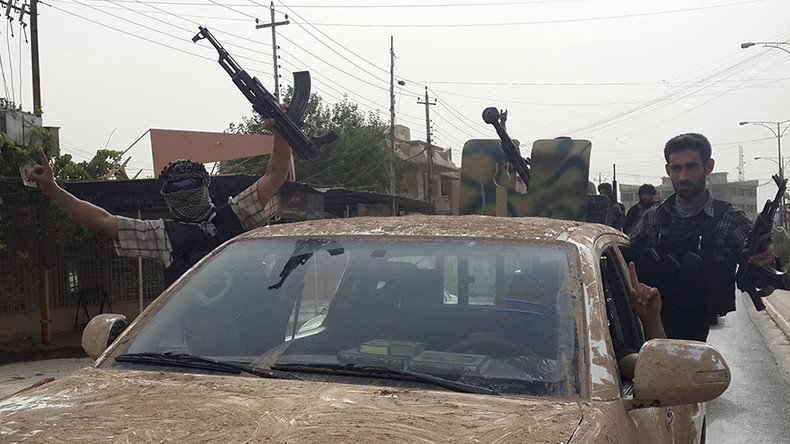Number of ISIS fighters in Syria and Iraq declined by thousands – US intelligence report

The Islamic State has lost thousands of fighters in Iraq and Syria, the White House said, praising the US-led coalition’s efforts. The latest American intelligence estimates show there are up to 25,000 militants, over 6,000 less than before.
“That means they continue to be a substantial threat, but the potential numbers have declined,” White House spokesman Josh Earnest told reporters, though he did not give much detail on the source of the estimates.
According to the “new assessment,” Earnest said the ranks of the Islamic State (IS, formerly ISIS/ISIL) have thinned out from the previously estimated number of up to 31,500 militants.
“The old assessment was a range of 20,000 to 31,500 fighters. The updated assessment is now a range of 19,000 to 25,000 fighters,” he said.
Speaking on the factors behind the decline, the White House pointed out “a number of airstrikes” by the US and its partners, as well as “success” and “some important progress” in stopping the flow of foreign fighters into Syria and Iraq.
“That’s a testament to the efforts of our partners on the ground who are taking the fight to ISIL on the ground. As a result of those efforts, ISIL has sustained significant casualties. It also is a testament to our aggressive military campaign in the air,” Earnest concluded. “ISIL is having more difficult time than they’ve had before in replenishing their ranks.”
‘You created ISIS!’: Press conference scandal mars Kerry’s visit to Italy https://t.co/jsX9nKh682pic.twitter.com/baPyFfnscG
— RT (@RT_com) February 4, 2016
However, the threat of the terrorist group expanding its footprint in Iraq and in Syria is still there, the White House representative said, stressing that Washington has been “mindful” of Libya and Afghanistan, two other potential targets of IS.
“We also know that ISIL has always had designs on looking for other areas that are experiencing political instability to try to establish another foothold,” Earnst said.
On Tuesday, the Pentagon said it was exploring ways to increase “the pressure on the enemy,” which “could be coalition boots on the ground.”
According to US Central Command (CENTCOM), the coalition has conducted 20 strikes on February 3.
More US, coalition forces likely needed to fight ISIS – Pentagon commander https://t.co/t4iAbu1coCpic.twitter.com/TaIV3t4neM
— RT (@RT_com) February 2, 2016
The US Air Force began a bombing campaign on IS positions in Iraq on August 8, 2014. On September 23 of that year, American warplanes started airstrikes in Syrian territory, provoking a highly negative reaction from Damascus, as Washington had not obtained the authorization of President Bashar Assad’s government to conduct operations in Syrian airspace.
The US-led anti-IS coalition (66 member states) has since been criticized for lack of significant progress.
On Wednesday, Russian Foreign Minister Sergey Lavrov also pointed out that the coalition’s “operations have become more effective,” while stressing that the success was not without Russia’s own efforts in Syria.
“We’re glad that with the success of the Russian campaign in Syria, the [US-led] coalition’s operations have become more effective,” Lavrov said.
‘Trumped-up, brazen’: Lavrov slams accusation that Putin is corrupt in phone call w/ Kerryhttps://t.co/mKmQ45buywpic.twitter.com/xpIlSKJY05
— RT (@RT_com) January 29, 2016
The Russian task force in Syria began airstrikes on IS positions in Syria on September 30, 2015, at the request of the Syrian government. Lavrov advocated for real-time coordination between the Russian and American air forces, and the forces fighting terrorist groups on the ground.
“Being pragmatic, we’re interested in coordination of our efforts with the US-led coalition. And not only to avoid incidents, but in something more practical and in-demand today: real-time coordination between those [forces] operating on the ground and the air force of Russia and the coalition,” Lavrov said.
LISTEN MORE:












